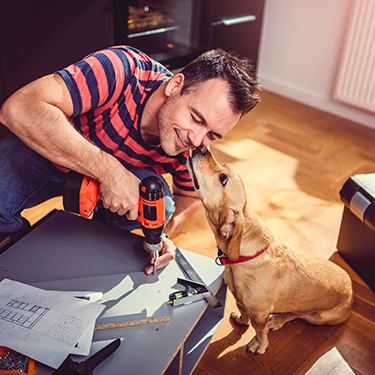Building Your Home's Equity
 Your home equity is the difference between what you owe on your home loan and what your home is currently worth. For example, if you owe $200,000 on your mortgage loan and your home is worth $250,000, you have $50,000 equity in your home. As your home equity grows, your house becomes more of an investment, allowing you to sell for a profit, increase your net worth, or borrow against it with a home equity loan. But short of simply waiting for home values to rise or your mortgage payoff amount to decrease, how can you accelerate your home equity? Read on for some helpful tips.
Your home equity is the difference between what you owe on your home loan and what your home is currently worth. For example, if you owe $200,000 on your mortgage loan and your home is worth $250,000, you have $50,000 equity in your home. As your home equity grows, your house becomes more of an investment, allowing you to sell for a profit, increase your net worth, or borrow against it with a home equity loan. But short of simply waiting for home values to rise or your mortgage payoff amount to decrease, how can you accelerate your home equity? Read on for some helpful tips.
Make a Large Down Payment
The down payment you make when purchasing your home (less fees associated with the purchase) instantly becomes equity. The larger your down payment, the greater your equity will be at the beginning of your home ownership.
A minimum of 20% is recommended since it will avoid an added expense of Private Mortgage Insurance (PMI) on most mortgages. When the down payment is less than 20%, the lender typically charges between 0.2% to 2.25% of the loan balance each year to protect their investment. The PMI is automatically removed for a conventional loan when you have 22% home equity. Reaching this goal allows more of your mortgage payment to be applied to the principal — and builds equity faster.
Increase Mortgage Payments
Equity grows with each mortgage payment, and making extra payments builds equity faster. Biweekly payments are a method to pay more on a mortgage in a year. For instance, if your monthly mortgage is $1,500, by the end of the year, you would have paid $18,000 with monthly payments. If you opted for biweekly payments at $750, the 26 payments made in a year would total $19,500. This amounts to one extra monthly payment in a year which can bring significant savings when applied to the principal, as the interest moving forward will be on this reduced balance owed. Check with your lender to see if a biweekly payment plan is a good option for your loan.
Look for other opportunities to make extra payments on your mortgage whenever you have room in your budget. Any extra amount paid to your mortgage saves money on the total interest paid on the loan, making your equity grow faster, and your mortgage can be paid off quicker, too! Make it a goal to pay a little extra whenever possible.
Smart Home Improvements
Not all home renovations increase the value of your home, so it’s important to know which updates have more value than others. When planning to sell, some less expensive repairs or renovations offer the best return on investment. Improving your home’s curb appeal is an easy way to make improvements without breaking the bank. Repainting the trim, replacing an old front door or garage door, and keeping up with yard work instantly make your home more attractive to a potential buyer.
In the kitchen, adding storage, creating a more open space, and updating appliances that are energy efficient are also effective in increasing value.
Other areas of the home that are of particular importance to buyers include the kitchen and bathrooms. Updating these areas or building an additional, spacious bathroom with plenty of storage will increase the value of your home, therefore increasing home equity. Just be sure to have a good idea of how much the project will cost and how much your home value will likely increase when weighing such a decision.
In the kitchen, adding storage, creating a more open space, and updating appliances that are energy efficient are also effective in increasing value. Find other home improvements that pay off on our blog.
Home Equity Loan Process
While the goal should always be to pay off your home loan as quickly as possible and never look back, sometimes life throws you circumstances that require money. If something like this happens to you, and the need exceeds your savings and all other means available, you can borrow against your asset with a home equity loan.
Home equity loans can fund further home improvements or repairs or pay off other debt that carries higher interest rates. The amount you can borrow is based on your loan-to-value ratio, or the ratio between your property’s value and the amount you still owe on your loan. Use Texell’s online calculator to determine how much home equity you have, and learn more about the home equity loan process on our blog.
If you have questions or are ready to start a home equity loan, Texell’s Home Loan Heroes are here to help. For more information and to view current rates, visit TexellHomeLoans.com or call 254.774.5104.
If you wish to comment on this article or have an idea for a topic we should cover, we want to hear from you! Email us at editor@texell.org.







